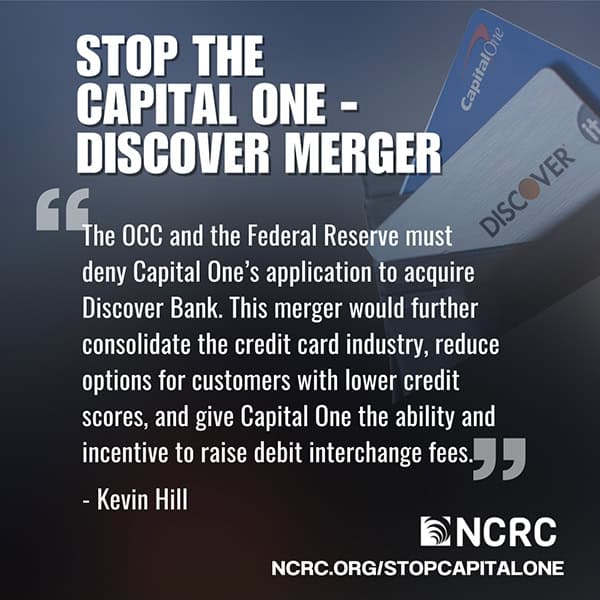NCRC Senior Policy Advisor Kevin Hill testified Friday, July 19, at a public hearing on the proposed Capital One-Discover merger. Here are his prepared remarks:
Hello, I’m Kevin Hill with NCRC.
The OCC and the Federal Reserve must deny Capital One’s application to acquire Discover Bank. This merger would further consolidate the credit card industry, reduce options for customers with lower credit scores, and give Capital One the ability and incentive to raise debit interchange fees. Capital One would also become the sixth largest US bank by assets, greatly increasing risk for the entire financial system in the event of an economic downturn given their concentration in credit cards. Capital One’s business practices and merger history also make it highly unlikely this merger would serve the public’s convenience and needs.
Capital One is built on luring people into debt that they’ll struggle to pay off.
Half of Capital One’s revenue comes from interest on outstanding credit card balances, which means it comes at the direct expense of people who’ve been unable to repay what they borrowed, with Capital One charging many of their customers at least $800 annually in interest payments alone.
Once it gets to the point where customers are unable to pay Capital One back, then Capital One will gladly take their customers to court. Capital One is an industry leader in filing debt collection civil suits. Debt collection lawsuits have grown to dominate state civil courts, with data from nine states indicating that debt collection lawsuits have risen to nearly 1 in 2 civil court cases in 2021, compared to 1 in 4 in 2013 and 1 in 9 in 1993. These debt collection lawsuits are highly predatory with customers sued rarely having legal representation, or not even being aware of the lawsuit as more than 70% of debt collection lawsuits result in default judgments where the defendant does not show up to court or respond to the suit.
Capital One’s filing of thousands of debt collection lawsuits raises a serious compliance question, as lenders are required to consider a customer’s ability to meet minimum payments before originating credit lines or increasing them, and Capital One’s high interest rates make it more difficult for borrowers to repay and more likely to fall into persistent debt where they are charged more in interest and fees then they pay back towards the debt they originally took out.
Furthermore, the OCC and Federal Reserve should look back at what happened after previous mergers involving the applicant bank.
Capital One’s merger with ING Direct was approved on the condition that Capital One ensure enterprise-wide compliance given its track record.
Capital One has not changed since acquiring ING Direct, continuing to rack up violations suggesting they are already too-big-manage at their current size, and too-big-to-care about complying with federal and state laws.
Since 2012, Capital One’s violations include a $390 million fine for failing to comply with the Bank Secrecy Act. Capital One admitted to willfully failing to maintain an effective anti-money laundering program that a former FinCEN Director noted “allowed known criminals to use and abuse our nation’s financial system unchecked.”
Banks with Capital One’s history of illegal and negligent behavior should not be allowed to acquire even more market power when they clearly have not addressed long-standing compliance issues.
Thank you for the opportunity to testify.



